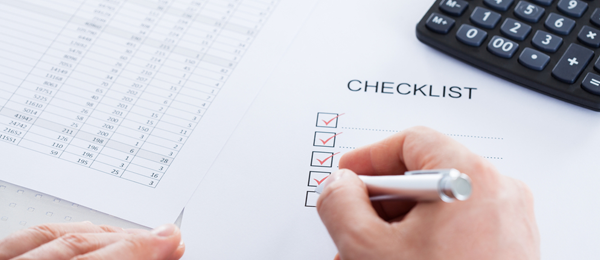Set out below is a list of items that will assist you with this process, and remind you of some of your tax obligations.
Penalties regime
There is a mandatory ’shortfall’ penalties regime in place – the penalties range from 20-150%. These penalties cannot be remitted. The rate of shortfall penalties may be reduced for previous good behaviour.
Examples of where automatic penalties will be applied include when:
- Motor vehicle logbooks are not kept. (If you are self-employed, a logbook must be kept for a 3-month period every 3 years).
- Please check that your work-related vehicles still meet the criteria, otherwise fringe benefit tax may be applicable.
- Stocksheets are not kept, or a stocktake is not physically taken.
- Bad debts are not physically written off before 31 March 2020.
- Tax on schedular payments (formerly withholding tax) is not deducted from contractors, unless they are operating as a company or have a certificate of exemption issued by Inland Revenue. The normal tax rate ranges from 10.5% – 33%.
- Resident withholding tax on interest (10.5%, 17.5%, 30% or 33% on election) is not deducted when paying interest of $5,000 or more per annum to a non-financial institution/individual (unless a certificate of exemption is supplied).
This tax is usually due on the 20th of the following month.
Deductions
Deductible expenses may be claimed in the year in which they are incurred, even though payment may be made in the following year. Following are some special expenses which are either deductible in full or in part when they are incurred, but are related to the next income year.
The following expenses have no restrictions on the amount deductible:
- Stationery;
- Subscriptions to newspapers, journals, and other periodicals;
- Postage and courier costs;
- Rates;
- Road user charges; and
- Audit and accounting fees.
Advertising
Prepaid amount less than 6 months and under $14,000.
Bad debts
To be deductible, bad debts must be written off during the income year. A mere provision or reserve is not deductible.
Consumable aids
Amount on hand under $58,000.
Depreciation
Taxpayers have the option of depreciating fixed assets on either a diminishing value or straight-line basis.
Fixed assets can only be depreciated from the month of purchase, eg plant and machinery purchased on 25 March 2020 is depreciated for one month.
Items costing up to $500 (net of GST) may be written off in the year of purchase if certain criteria are met.
Disability/loss of profits insurance
Premiums are deductible in full where the taxpayers are in business on their own account, or are employees.
Discount reserve
A deduction for a discount reserve, such as a prompt payment discount reserve, is allowed if debtors are entitled to this discount.
In the first year, a deduction of 2.5% of the debtors’ amount is allowed, and in subsequent years adjustments are made which maintain the discount level at 2.5% of the debtors’ amount. If a higher discount is generally given, this could be used instead of the 2.5%.
Equipment service contracts or warranties
The full amount is deductible, provided it forms part of the consideration for the assets.
Holiday pay
The amount accrued at balance date is deductible, if paid within 63 days of the balance date.
Prepaid insurance premiums
Where the total insurance expense under an insurance contract in the year does not exceed $12,000, a 12-month prepayment is claimable.
Lease or bailment of livestock
Prepaid amount less than 6 months and under $26,000.
Other services
Prepaid amount less than 6 months and under $14,000.
Rent for land and buildings
Prepaid amount less than 6 months and under $26,000.
Repairs and maintenance
Generally no deductions are allowed for a repairs and maintenance reserve, except for the periodic overhaul of business aircraft and the maintenance obligations of a construction firm under its building contracts.
Royalties
Royalties accrued to balance date are fully deductible.
Service or maintenance contracts
A prepayment of 3 months’ expenses is deductible, provided the total expense on the contract does not exceed $23,000 in the income year.
Subscriptions for trade professional associations
A prepayment of 12 months is deductible provided the total amount for that association in the year does not exceed $6,000.
Telephone and other communication equipment expenses
A prepayment of 2 months is deductible.
Trading stock valuation
Don’t forget to do a stocktake!
If the turnover is less than $1.3m and a reasonable estimate of the true value of stock is made to be under $10,000 then a physical stockcount at year-end is not required and the opening stock value may be used.
Please contact us to establish the valuation rules that apply to your situation.
Travel and accommodation expenses
Prepaid amount less than 6 months and under $14,000.
Legal Fees
If the total legal expense for the year is $10,000 or less, there is no requirement to identify the capital portion but it still has to meet the general permission criteria for deductibility first.
Income
Review credit notes in the months following balance date for any credits which are able to be taken back into the previous financial year.
You can give us a call on 1300 791 600 for a quick chat.
The information in this article is indicative of NZ tax rules and changes and not intended to be complete for all intents or purposes and does not constitute advice. It is recommended that you obtain professional advice, suited to your particular circumstances, from us before acting on anything you read.

